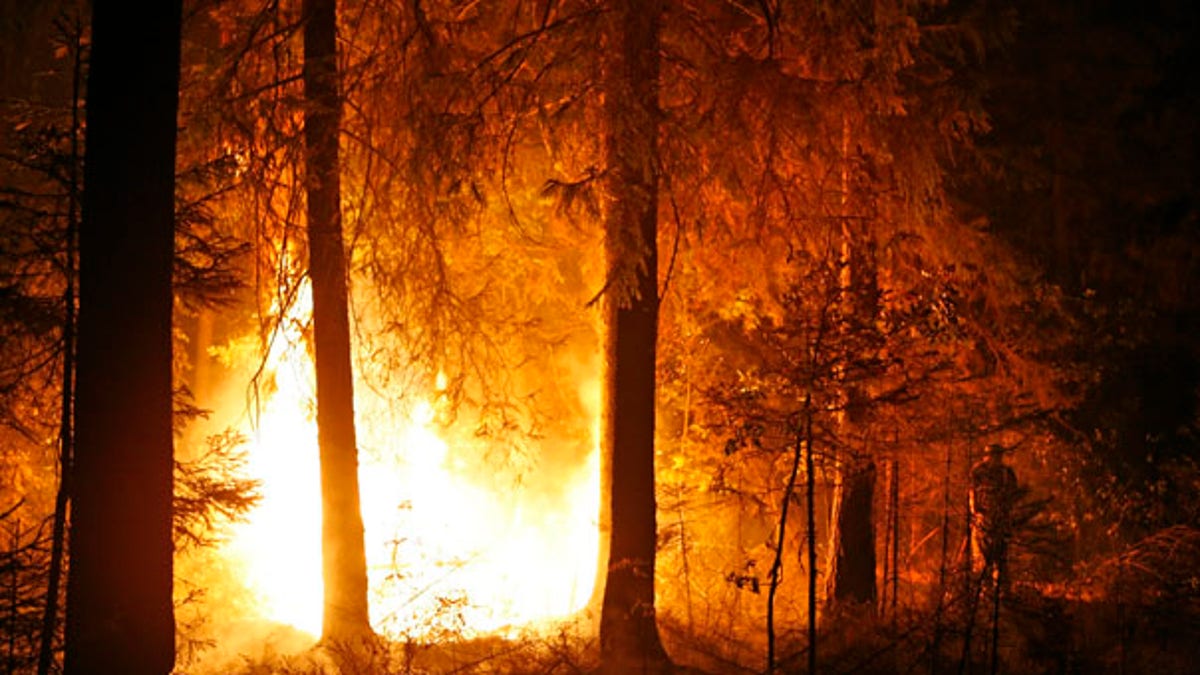
Aug. 13: A volunteer tries to extinguish a forest fire near the village of Kovrigino, about 45 miles east of Moscow. (AP)
A new blaze is raging perilously close to Russia's main nuclear research center, forcing firefighters to call for reinforcements Friday as they attempt to battle an inferno that has engulfed the country and already left 54 dead.
Powerful rains helped stem some of the hundreds of fires burning throughout Russia and cleared the air in Moscow, but have not stopped the spreading blaze near Sarov, the birthplace of Russia's nuclear program, where thousands of firefighters are now being deployed.
The fire near the country's top nuclear site started in a nature preserve earlier this week, AFP reported, and Russian officials have now dedicated 2,600 people and 200 pieces of equipment to their round-the-clock rescue efforts.
"The fire which appeared in the eastern part of the nature reserve two days ago after lightning struck a pine tree has grown in size and now presents a certain danger," the head of the emergencies ministry for Mordovia, Major General Vyacheslav Kormilitsyn, said in a statement.
Fire crews have been battling wildfires in the Bryansk region, the part of Russia that suffered the most from the Chernobyl catastrophe in what was then Soviet Ukraine, Emergency Situations Ministry spokeswoman Irina Yegorushkina said.
She said radiation experts from Moscow determined there has been no increase in radiation levels in the Bryansk area, on the border of Belarus and Ukraine. The soil holds radioactive particles that settled after the Chernobyl nuclear power plant's reactor No. 4 exploded during a pre-dawn test on April 26, 1986, spewing radioactive clouds over much of the western Soviet Union and northern Europe.
Environmentalists have warned that the particles could be thrown into the air by wildfires and blown into other areas by the wind.
Emergency Situations Minister Sergei Shoigu acknowledged the danger last week, but said Wednesday "the situation here is not as difficult as in the areas around Moscow," where acrid clouds of smog from the fires have polluted the air.
Hundreds of wildfires sparked by the hottest summer ever recorded in Russia have engulfed large areas of western Russia. Moscow's death rate has doubled to 700 people a day. Morgues have been overflowing, and residents have been desperately seeking ways to stay cool amid soaring temperatures and air pollution.
About 165,000 workers and 39 firefighting aircraft were battling more than 600 blazes nationwide Wednesday over 220,000 acres (more than 90,000 hectares), the Emergency Situations Ministry said.
In several southwestern regions hit by the Chernobyl fallout, fires have engulfed about 9,600 acres (3,900 hectares), though most of those blazes have been snuffed out, said Vasily Tuzov, a deputy head of the federal forest protection service.
He said it wouldn't be clear if fires had spread radioactive particles into previously unpolluted areas until workers had conducted tests. "All we know now is that there have been fires in the areas with higher radiation levels," he told The Associated Press.
But Emergency Situations Ministry official Vladislav Bolov insisted Wednesday that a check of the areas contaminated by Chernobyl this week proved the fires had not spread any radiation, the ITAR-Tass news agency reported.
The Bryansk forest protection service has increased patrols around the Bryansk forests, particularly in the southwest section affected by Chernobyl, agency chief Vladimir Rozinkevich said. "There is a danger, but we are controlling the situation," he said.
A Russian forest expert said the mixture of radioactive elements remaining in the forest floor was still dangerous.
"A cloud may come up with soot and spread over a huge territory," said Alexander Isayev of the Moscow-based Center for Forest Ecology and Productivity.
In Vienna, the International Atomic Energy Agency said it had no comment on the radioactive dangers posed by the wildfires.
Click here for more on this story from Agence France-Presse.
The Associated Press contributed to this report.
